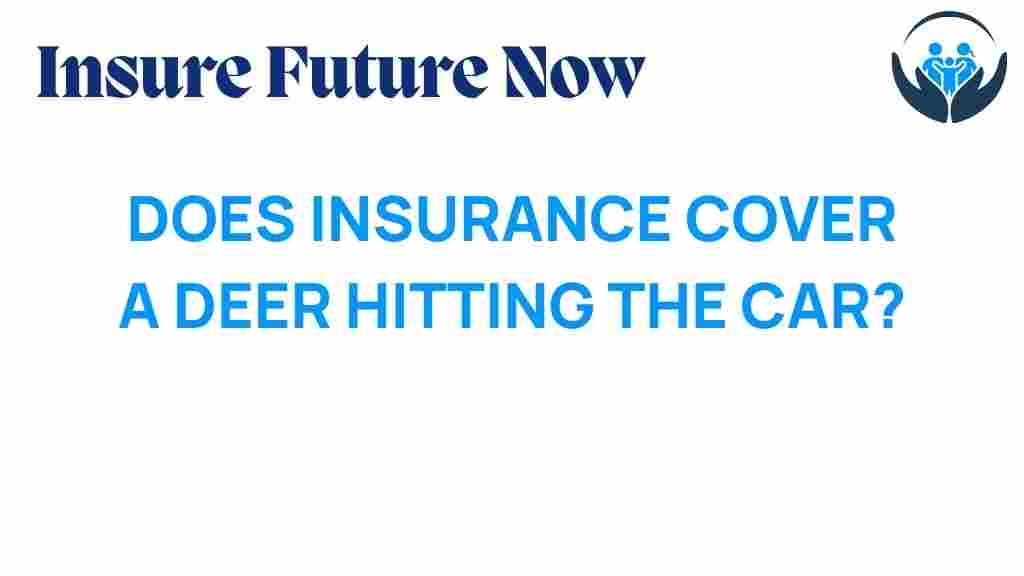Does Insurance Cover a Deer Collision?
Car accidents involving wildlife, particularly deer collisions, are a common concern for many drivers. These encounters can lead to significant damage to vehicles and may raise questions about insurance coverage. Understanding how your auto insurance policy handles such unexpected damages is crucial for any driver. In this article, we will unpack the myths surrounding deer collisions, explore the claims process, and provide insights into policy details that can help you navigate the aftermath of a deer collision.
Understanding Deer Collisions
Deer collisions occur when a vehicle strikes a deer, often leading to severe damage to the car and possible injury to the occupants. The frequency of these incidents tends to increase during specific times of the year, particularly in the fall when deer are more active. According to the Insurance Institute for Highway Safety (IIHS), over 1.5 million deer-related car accidents occur annually in the United States.
The Importance of Insurance Coverage
Having comprehensive auto insurance is essential for protecting yourself from the financial burden of unexpected damages caused by deer collisions. Many drivers are unclear about whether their insurance will cover these incidents. Let’s dive into the specifics.
Insurance Coverage for Deer Collisions
When it comes to deer collisions, your auto insurance policy can play a crucial role in covering the damages. However, not all policies are created equal, and understanding the details can help you avoid unwanted surprises.
Types of Auto Insurance Policies
- Liability Insurance: This type of insurance covers damages you cause to other vehicles or property but does not cover your own vehicle’s damage in a deer collision.
- Collision Coverage: This covers damage to your vehicle resulting from a collision, regardless of whether it’s with another car or a deer. However, you’ll need to pay a deductible.
- Comprehensive Coverage: This is the most relevant type of coverage for deer collisions, as it covers damages caused by non-collision events, including wildlife encounters.
Will My Insurance Cover a Deer Collision?
In most cases, if you have comprehensive coverage, your insurance will cover the damages from a deer collision. However, it’s essential to review your specific policy details. Here are some key points to consider:
- Check if you have comprehensive coverage included in your policy.
- Understand your deductible; you will need to pay this amount before insurance kicks in.
- Review any exclusions in your policy that may affect coverage.
Filing a Claim After a Deer Collision
If you find yourself in the unfortunate situation of a deer collision, knowing how to file a claim can ease the process. Here’s a step-by-step guide:
Step 1: Ensure Safety
First and foremost, check for any injuries to yourself or passengers. If it’s safe to do so, move your vehicle to the side of the road to prevent further accidents.
Step 2: Document the Incident
Take pictures of the scene, including damage to your vehicle and any visible deer. Note the time, date, and location of the accident.
Step 3: Contact Your Insurance Company
Inform your insurance provider as soon as possible. Provide them with the details of the accident and any documentation you have gathered.
Step 4: File a Claim
Your insurance company will guide you through the claims process. You may need to fill out a claim form and provide additional information.
Step 5: Vehicle Assessment
Once your claim is filed, your insurance company may send an adjuster to assess the damage to your vehicle.
Step 6: Repair Process
If your claim is approved, the insurance company will discuss repair options with you. You can have your vehicle repaired at a shop of your choice or one recommended by your insurer.
Common Myths About Deer Collision Insurance Coverage
Several myths surround insurance coverage for deer collisions. Let’s clarify some common misconceptions:
- Myth 1: All insurance policies automatically cover deer collisions.
Fact: Only policies with comprehensive or collision coverage will cover these incidents. - Myth 2: If I hit a deer, my rates will automatically increase.
Fact: While some insurers may raise rates, others might not penalize you for accidents involving wildlife. - Myth 3: I do not need to report a deer collision if there are no injuries.
Fact: It’s advisable to report all accidents to your insurer, regardless of the severity.
Troubleshooting Tips for Deer Collisions
Here are some troubleshooting tips to help you prepare for and respond to deer collisions:
- Stay Alert: Be vigilant, especially during dusk and dawn when deer are most active.
- Use Deer Whistles: Consider installing deer whistles on your vehicle, which may help deter deer from crossing the road.
- Drive Defensively: Reduce speed in areas with high deer populations, and be prepared to brake suddenly.
- Know Your Policy: Regularly review your auto insurance policy to ensure you have adequate coverage for wildlife encounters.
Additional Resources
For further information on dealing with deer collisions and understanding your insurance coverage, consider visiting the Insurance Information Institute. They provide comprehensive resources regarding auto insurance and wildlife encounters.
Conclusion
Understanding whether insurance covers a deer collision is crucial for any driver. With the right auto insurance policy in place, you can protect yourself from the financial burden of unexpected damages. Remember to check your policy details, file a claim promptly, and stay informed about the myths surrounding wildlife encounters.
By being proactive and prepared, you can mitigate the risks associated with deer collisions and ensure that you are covered when accidents occur. Stay safe on the road, and remember that knowledge is your best defense against unexpected car accidents.
This article is in the category Claims and created by InsureFutureNow Team
